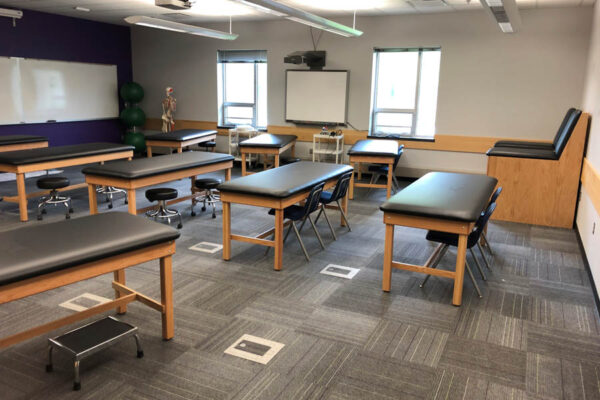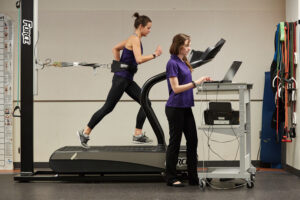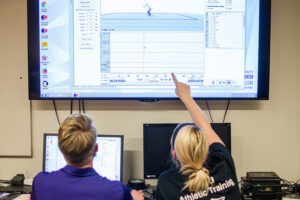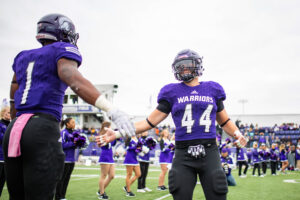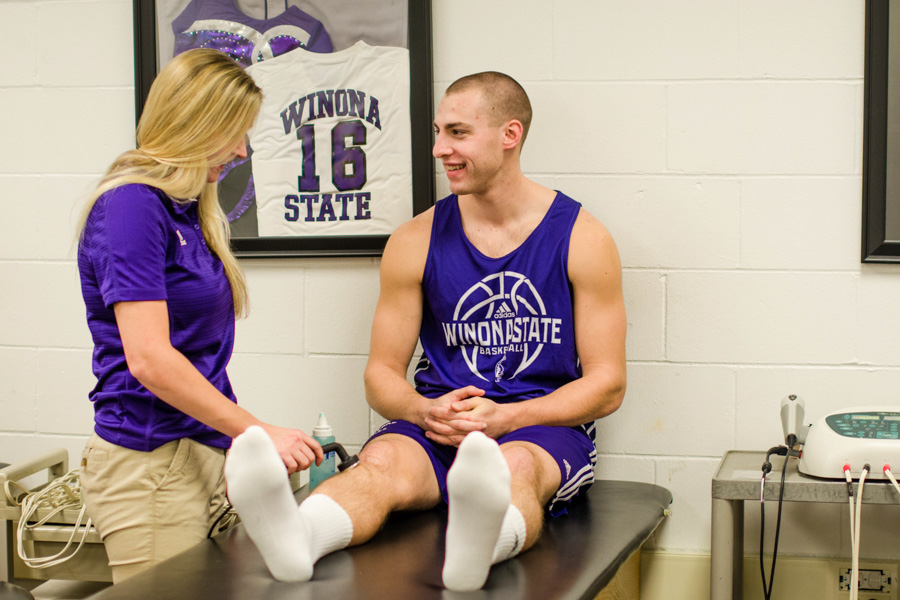
Athletic Training
Master's
PROGRAM SNAPSHOT
Build on your undergraduate background to join an in-demand, rewarding healthcare field. Turn your passions for sports and helping people into a professional career.
Athletic trainers are professionally prepared healthcare providers focused on serving active populations, including athletes at all levels of participation. Athletic trainers provide emergency care, diagnose conditions, and develop rehabilitation plans to treat their patients now and prevent further damage later.
Athletic trainers also work with individuals of all age groups—from children and the elderly—and patients at different settings—from athletes to soldiers—all with the same goal: helping prevent and treat sports injuries and illnesses.
Become a certified athletic trainer with the Master of Science in Athletic Training (MSAT) at Winona State in as little as 2 years.
Designed for students who already have a bachelor’s degree, the MSAT program features many opportunities for students to gain competitive certification and more than 1,000 hours of clinical practice.
This program is accredited by the Commission on Accreditation of Athletic Training Education (CAATE) and is available through WSU’s Department of Athletic Training and Department of Health, Exercise & Rehabilitative Sciences (HERS).
As an Athletic Training student, you’ll learn and practice athletic training skills at both the traditional and advanced levels.
You’ll also:
- use casting techniques to protect fractured limbs.
- work with the best technology—from suturing to IV insertion to manikin simulations.
- use diagnostic ultrasound to assess injuries or disorders to muscles, ligaments, spinal discs, and more.
- gain advanced credentials such as Corrective Exercise Specialist certification and Graston Technique training.
- stay on top of emerging trends in athletic training, including emergency care, psychosocial health care, and diagnosis, evaluation, and therapeutic interventions.
Your coursework will prepare you for careers in a variety of advanced practice settings, like the National Basketball Association (NBA); National Football League (NFL); NCAA Division I, II, and III institutions; sports medicine clinics and hospitals; and even performing arts, military, and high school settings.
Get to know Dr. Brian Zeller and learn why he’s passionate about the field of Athletic Training.
Learn More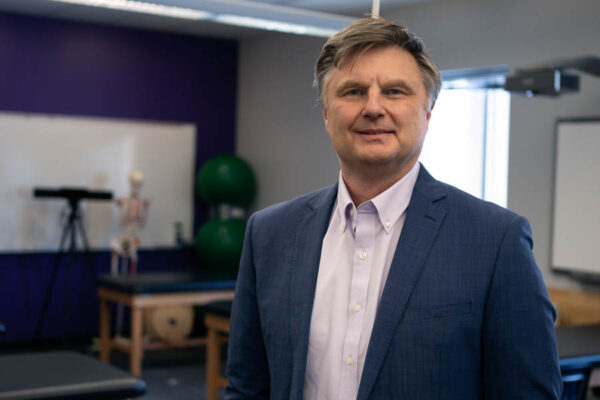
In the Classroom
As an Athletic Training Student, you’ll have access to cutting-edge equipment.
Our simulation manikin allows students to practice emergency care—from CPR to airway insertion to vital sign assessment—and to identify different cardiac and respiratory sounds.
And with our diagnostic ultrasound unit, students get great practice before working with real-world clients.
Get the real-world preparation you need to become an athletic trainer along with your degrees.
The Athletic Training program incorporates extra instruction right into the curriculum, preparing students to achieve Corrective Exercise Specialist certification through the National Academy of Sports Medicine (NASM).
Winona State offers students access to Basic Life Support certification through the American Red Cross.
We incorporate Graston M1 training in the classroom, so students can practice advanced manual therapy techniques during clinical education experiences.
You’ll also earn Mental Health First Aid certification through the National Alliance on Mental Illness (NAMI) to recognize early signs or symptoms that someone with a mental health challenge may have and refer them to the right support services.
Engaged Learning Spaces
Winona State has state-of-the-art facilities that offer Athletic Training students the space to:
- practice their clinical skills.
- expand their classroom learning.
- mature into outstanding healthcare professionals.
This teaching laboratory hosts Athletic Training lab courses for both classroom instruction and supervised skills practice.
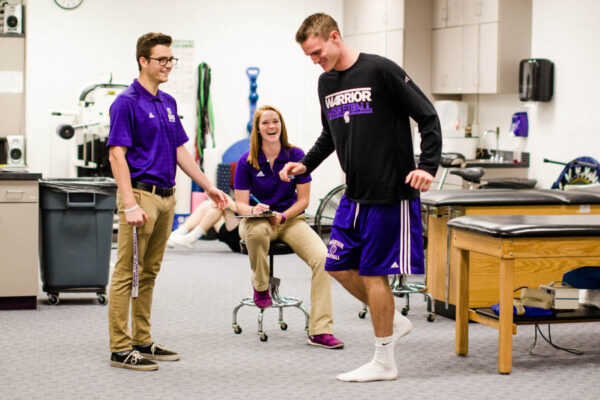
As a primary clinical site for Athletic Training students, this space is where students evaluate, diagnose, and treat Warrior athletes.
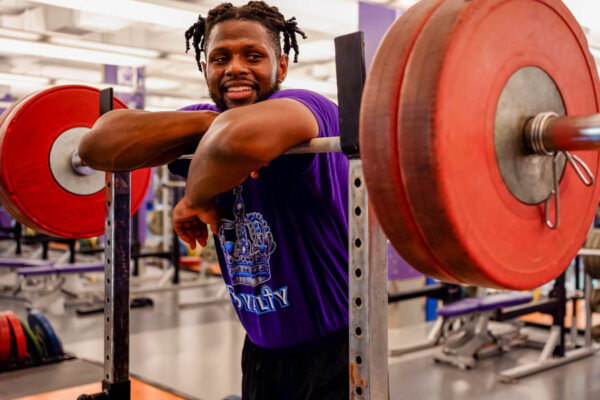
The IWC houses strength and conditioning, counseling services, intramurals, and other specialty areas for students to incorporate into patient care.
Beyond Campus
Once admitted to the MSAT program, students complete 1,000 hours of clinicals.
During the first year of the program, Athletic Training students complete their clinicals locally with Warrior Athletics, St. Mary’s University, and other local clinical sites.
Students who are farther along in the MSAT curriculum also complete 2 intensive, 10-week immersive experiences, which can be done anywhere in the nation.
These experiences are designed to help students develop into highly skilled and independent healthcare professionals who can advance the care of all.
Stand out on your job applications with impressive volunteer experiences.
Athletic Training students have assisted in providing medical coverage at the American Birkebeiner, the largest cross-country ski race in the U.S.
Students are also uniquely involved with Bridges Health, a local healthcare clinic providing care to all socioeconomic populations in the community.
Apply what you learn in the classroom by traveling the world. At WSU, you can earn credit that applies to your degree while exploring the globe.
Learn about health promotion in Peru; food systems in Hawaii; and health, exercise, and medicine in England and Ireland.
Dive into the business of health care in Paris or child welfare and health systems in Jamaica.
Complement your studies and meet other students who are passionate about athletic training through campus clubs and organizations.
Join the Pre-Athletic Training Club, Movement Science Club, or LeadHERS for Winona State HERS Alumni.
Check out Alpine Club, Climbing Club, and other year-round sports clubs and intramural sports teams.
You can also become a student health and wellness advocate.
According to the Bureau of Labor Statistics, the field for athletic trainers is expected to grow 14% by 2031.
The Master of Science in Athletic Training (MSAT) program is currently accredited by the Commission on Accreditation of Athletic Training Education (CAATE).
The CAATE reports student achievement and performance data for all accredited programs that is aggregated over the most recent three-year period. View CAATE Data for WSU.
The WSU Athletic Training program is committed to providing the best educational experience to the students accepted and enrolled in our professional degree program.
To ensure program effectiveness multiple points of assessment data are gathered to evaluate the success of the curriculum, the clinical experiences, and our students.
View the MSAT Outcome Measures Chart (PDF).
The following information complies with Regulation 34 CFR 668.43 (a) (5) (v) through the U.S. Department of Education:
WSU’s Athletic Training program curriculum meets state educational requirements in the states/jurisdictions of: Alabama, Alaska, Arizona, Arkansas, California, Colorado, Connecticut, Delaware, Florida, Georgia, Hawaii, Idaho, Illinois, Iowa, Kansas, Kentucky, Louisiana, Maine, Maryland, Massachusetts, Michigan, Minnesota, Mississippi, Missouri, Montana, Nebraska, Nevada, New Hampshire, New Jersey, New Mexico, New York, North Carolina, North Dakota, Ohio, Oklahoma, Oregon, Pennsylvania, Rhode Island, South Carolina, South Dakota, Tennessee, Texas, Utah, Vermont, Virginia, Washington, West Virginia, Wisconsin, Wyoming, and District of Columbia.
This information was last updated on July 1, 2021.
